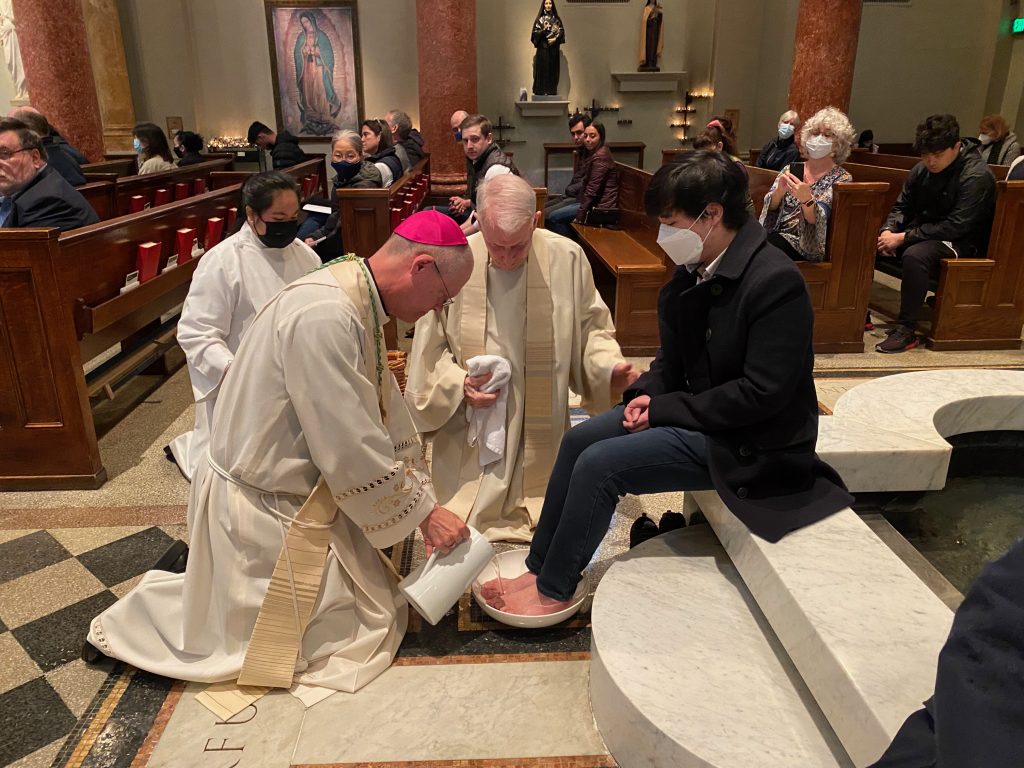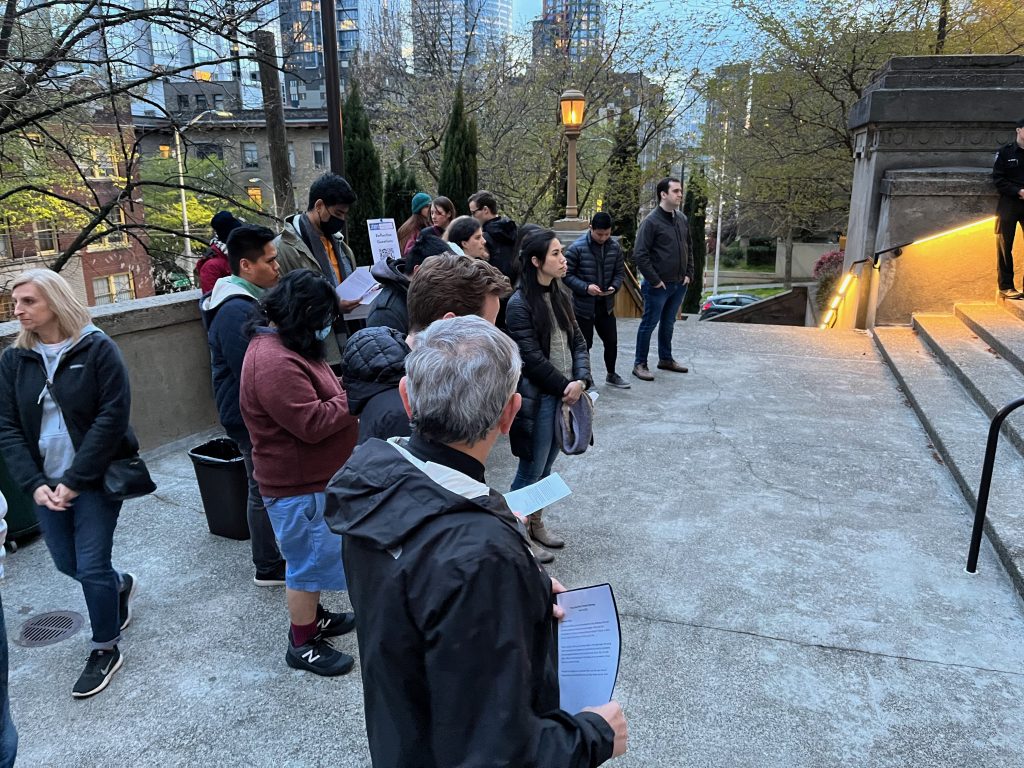As we begin this Sacred Triduum, I share with you the homily from this evening’s Mass of the Lord’s Supper at St. James Cathedral. You can watch the video below, or read the text that follows.
As I write, a group of young adults has begun a pilgrimage in Seattle visiting numerous churches to pray at the altars of repose. Let us all keep watch with Christ this holy night as we commemorate once again his great gift of saving love.
Jesus Christ Our New And Everlasting Covenant
It is hard to fathom all that God accomplished on this holy night many years ago. The Last Supper had its roots in the events of the great Exodus from Egypt. All the way back to the creation of our first parents, Adam and Eve, and even prior to that, God has known us from the beginning of time. (Ephesians 1:4, Jeremiah 1:5)
So, when we hear in John’s Gospel this evening that “Jesus loved his own in the world and he loved them to the end.” (John 13:1) we must keep this timeless love of God in mind, and realize it envelops all of creation, not just humanity. In other words, the love of God manifested in the life, death and resurrection of Jesus has cosmic implications. (Colossians 1:17) But, tonight we will look at the implications of Jesus’ actions for us, and how our actions are to manifest what we have received from Christ, namely this timeless love of God.
As Jesus shared the Passover meal with his disciples, he gives this meal its fullest meaning. In other words, the Passover meal was always pointing to something greater, and in this moment, the ‘symbol’ of the meal is present in the person of Jesus who is the Passover – our salvation. As lambs were slaughtered so their blood could mark the doorways of the Israelite people during the night of the Passover in Egypt, Jesus is the Lamb who this very night is handed over to be killed, whose blood will be shed as the ‘new and eternal covenant’; poured out for the salvation of the world. (Eucharistic Prayer 1)
After Jesus identifies this Passover meal with his own sacrifice and commands it be continually celebrated in his memory (Luke 22:19; 1 Corinthians 11: 24) he goes even further making a direct link between receiving his body and blood in the Eucharist to an act of loving service by washing the feet of his disciples. Once again, Jesus informs his disciples that they too are called to humble service, and that in caring for others, they will find great fulfillment of life.
Do you realize what I have done for you? You call me ‘teacher’ and ‘master’ and rightly so, for indeed I am. If I, therefore, the master and teacher have washed your feet, you ought to wash one another’s feet. I have given you a model to follow, so that as I have done for you, you should also do.’ (John 13: 12-15)
Practically, this instruction of Jesus along with our reception of his Body and Blood at every Eucharist leads us to several conclusions:
In every Eucharist, we receive the body and blood of Jesus Christ. By receiving the Body and Blood of the Risen Christ, he shares his life with us, thus conforming us more and more closely to himself.
It is ‘right and just’ that we reverence Christ, present in the Eucharist. But sound theology does not stop there. We also speak of the Church, in each person and all her members together as the Mystical Body of Christ. Through this Passover meal, Jesus frees us from our sins and joins us to himself in a real and intimate way. Thus, Christ who unites each person to himself unites us to one another! Thus, we speak of one, holy, catholic Church.
Now, recall Jesus washing the feet of his disciples and telling them that they must do as he has done. What this means for us is that we who by the reception of the Eucharist are now carrying Christ within us, are in his name and person to go forth and serve others, always mindful of the poor and forgotten. We go forth as Christ, seeking Christ in others, and serve him in them. In other words, we now are to love those who are in the world, and love them to the end.
Notice the sense of ‘movement’ here – from the Eucharist to the world; From Christ to Christ in others. And when we consciously serve others because we are allowing Christ to live and move in us, allowing Christ to love others through us, finding and serving Christ in others, these encounters become sacramental moments as well. So this ‘movement’ occurs from Eucharist to the poor, from Christ to Christ, from Sacrament to sacrament.
My friends, it is precisely in this ‘movement’ where the church lives – where Christ lives. And thus for the believer, our life is a continual walk with Christ from the altar to the streets and back again. In this ‘journey of faith’ we continually bring Christ to others, and others to Christ. This walk, this journey, this accompaniment, this ‘camino’ is where we are church, is where the church lives. This is what a lived, vibrant faith looks like. This is what being a disciples entails.
Yes, Holy Thursday is about Eucharist and Priesthood. But let us not keep these gifts in some pious box that does not truly touch our life, nor allow us to remain aloof from touching the lives of others. Through the Incarnation, Jesus entered the world. Through his earthly life and ministry he demonstrated the nearness of God. Through his passion, death and resurrection, Jesus left us a new and eternal covenant.
Jesus continues to accompany us today through the Eucharist. As Church, as members of the Mystical Body of Christ, we draw our identity from the Eucharist. Let us now live this deepest reality of our Christian identity by keeping the great commandment of Christ to love others as he has loved us.
0

